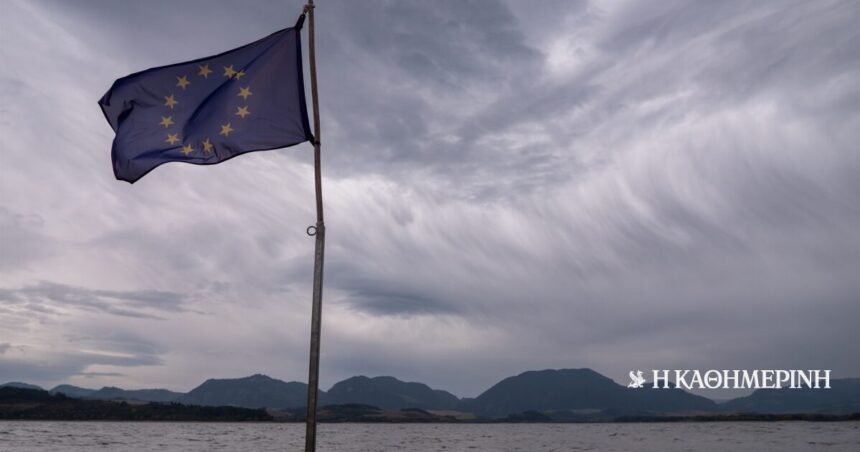Any book on the history of ideas, perceptions and the prehistory of the European Union can serve not only as a reference point, but also as a starting point for multiple readings; especially when its author is one of the most distinguished intellectual historians and a professor at UCLA, the British Anthony Pagden. In “Pursuit of Europe(published by Alexandria, translated by Eleni Asteriou), Pagden touches on a series of issues that directly concern the current crisis of European identity, but also the future of the European Union, always being aware that reality has a bad habit of being, usually, more complex.
– EE in its current form is not, as is often presented, a random result of an effort, but the product of a long historical process. Can you tell us what the central thread of this book is and how it unfolds?
– A notion that the peoples of “Europe” have what we would today call a common identity has existed since ancient times. The Greeks, after all, gave the continent its name, and of course a mythological origin (based, it is true, on a rape). The Roman Empire and the later concept of “Christianity” also gave it a kind of common heritage.
– However, what really united Europe as it is today, as something more than a simple geographical entity, was Roman law and Christianity.
– Today the E.U. it is a thoroughly secular project, and secularism has been, since the Enlightenment, a central feature of any European identity. It combines the Epicurean values of the ancient world with some of the virtues of Christianity, without the patriarchy, censorious persecutory views, and a frankly absurd mythology, which inspired Judeo-Christian and then Muslim monotheism. But as I say in the book, we should not underestimate the importance – nor the potential danger – of Europe’s Christian roots. Some, like Georgia Meloni, for example, have them ingrained very well! There have been other unification projects and all of them, like the EU, were initially linked to efforts to bring about “permanent peace” on the continent. But what I wanted to emphasize in the book is that as important as the idea of peace and the ideal of a unified Europe are, they are by no means the only aspirations of the “European movement”.
We must avoid the tendency towards a form of European nationalism and I think it is symbolic as well as successful that while the E.U. has “anthem”, he has only music and no words!
– It is very interesting that at some point in the book you mention the etymology of the term nation (something that is born, but not created). Did it always have the same content? How did the concept evolve?
– The terms “nation” and “state” are very slippery. They are often used as synonyms and sometimes also together with “the people”. But I have tried to argue that the best way to understand them is to accept that ‘nation’ refers to all that we think of as the cultural, linguistic, religious aspects of a ‘people’. The “state” is the state, the administration, the legal system, the government, which gives all these the power to endure. Certainly, a legal system can easily become part of a people’s identity – at least on one level. The Napoleonic Code, still in force in many parts of the world today, was precisely intended to give all the peoples upon whom it was imposed a sense of belonging to a common legal “nation.” The great Roman – Byzantine, in fact – codification of the emperor Justinian in the 6th century AD had done the same.

– Another historically changing concept is culture/civilization, from the final victory of man against nature, to the society united by the common understanding of its culture. Today do you have the feeling that we are in a new historical transition of the concept of civilization?
– Another complicated term is culture. In the late 18th century it had a very specific legal etymology. And until very recently, it meant only societies governed by law. This is how the great “positivist” jurists of international law used the term in the 19th century, but also liberal thinkers, such as John Stuart Mill. Today, of course, it means something more, even if that something—say, a state structure that can protect and care for people, as well as even more intangible goods, such as a sophisticated body of arts and sciences—ultimately depends on the rule of law. Of course, international law is a central part of my argument. The EU, after all, is based on a series of treaties which are of course legal agreements, and EU law. it is obviously a form of international law, even if it is limited to a very specific group of states. The origin of modern international law is the Roman ius gentium. And the jurists of international law in the 19th century, who transformed what had previously been considered a system of justice – an ius – based on natural law, into the positive legal order that exists or strives to exist today, were all concerned with one way or another, with empire: how to define it or, in the case of some, like the Belgian Ernest Niss, how to limit or catalyze it. Since then, international law has been denounced by many in the so-called Global South as a mere instrument of European imperialism. But this argument is mainly used by authoritarian leaders – such as Singapore’s Lee Kuan Yew and Malaysia’s Mahathir Mohamad – as a pretext to deny their people the protection and rights they deserve. And it is based on a confusion between genesis and validity, that is, between the beginnings of a rule and the conditions of its validity. Today, for example, we do not reject democracy because it was the product of a society of slaveholders who saw women as inferior, imperfect versions of men and who were capable of condemning people like Socrates to death for “disrespecting” the gods and “corrupting the youth” ». The same is broadly true of international law, particularly of what is today perhaps its strongest, though almost always most controversial, component: human rights.
– If we agree that one of the main characteristics of European populism is anti-Europeanism, do you consider that its hard base is the fear of possible erosion of national sovereignty? And if so, doesn’t that mean politically that there was a failure, that the people’s sense of community was not set as a self-evident goal? Could it be that the E.U. not a goal, but a process?
– That’s a question! The new populism of Georgia Meloni and Jordan Bardela, let’s say, is not really anti-European. More worrying to any good liberal is a will to make the E.U. something else, something more to their liking, more closed, whiter, more Christian (and we must admit that there are indeed historical bases for all of this). Orban has been saying this since 2017, but I was very worried when I saw him holding a joint press conference with Meloni. What they want is, as Meloni has put it, a “Europe of patriots”. I don’t really believe that will happen, I think the main threat facing a liberal, open Europe remains its future breakup. I think that the E.U. can create a community – the question is what kind of community. The obstacle is that, once again, it has the nation-state as its model. We must avoid the tendency towards a form of European nationalism, and I think it is symbolic as well as successful, that while the E.U. has “anthem”, he has only music and no words! The E.U. it is also in a state of constant change. So I would say that we are talking about a state, but, unlike most nation-states, the E.U. constantly expanding. It lost Britain but gained Finland and, as Macron said in April this year, “Ukraine and Moldova are part of our European family and must join the European Union when the time comes, just like the Western Balkans” – which I consider it a thinly veiled policy statement. Each of these new arrivals imposes new conditions, makes new demands, by its mere presence, and the whole must be able to respond. As Macron also said in April, quoting from Camus’s “Letters to a German Friend,” Europe “is an adventure that we continue to live, in spite of all doubters, with the inspiration of the intellect” (this maybe it’s easier to translate into Greek than into English!).
It changes, but it does not abandon its values
Henceforth, the continuation can only be politics?
No. I think Europe is changing its cultural, legal and political identity without giving up its “core values” (so to speak). It is not the same as 1945, let alone 1815. But it is mere platitude to say that all human beings live in time, that nothing remains the same. Most of those who predict catastrophes and unsurpassed judgments in the future, who confidently foretell the inevitable coming of the Apocalypse, are simply old men (for almost all men are) mourning their lost youth. You will remember that wonderful poem by Cavafy, “Waiting for the Barbarians”. If we don’t believe in our future we can sit around waiting for the end of our world to come, only to discover that the barbarians will never come, that they may never have existed.




